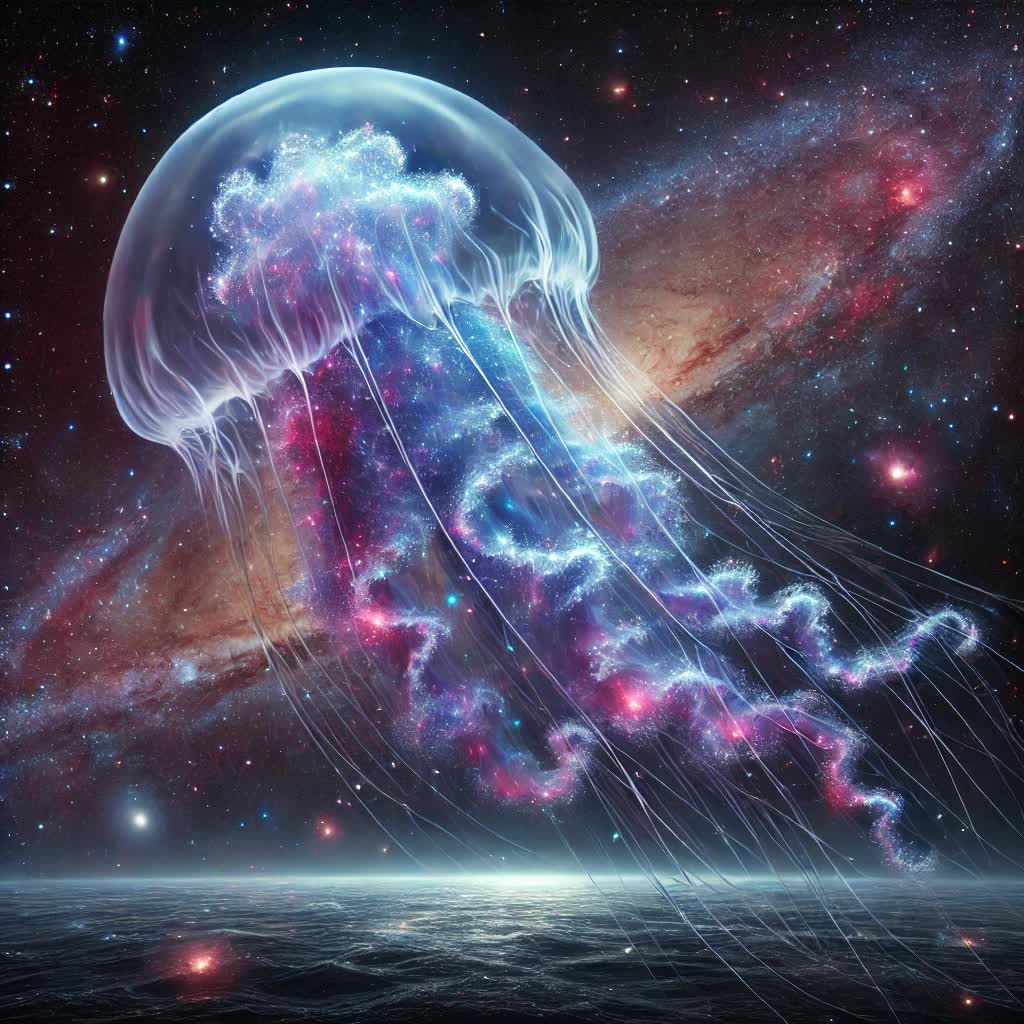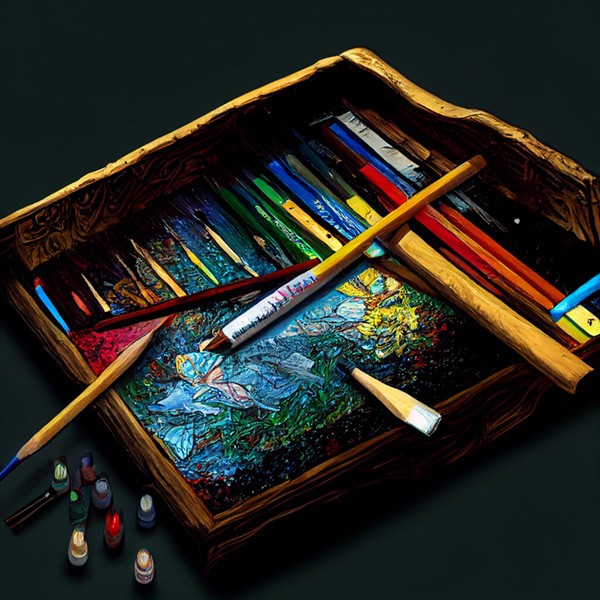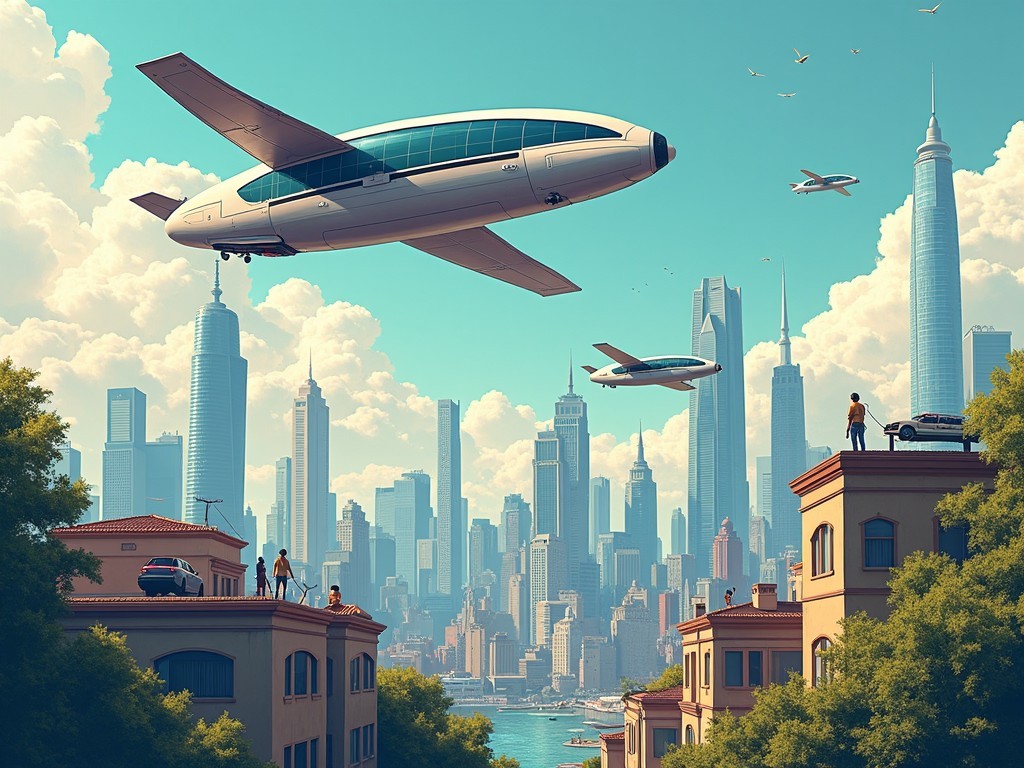Generative AI Models and Prompt Engineering
Popular AI Image Generation Models:
DALL-E
DALL-E, created by OpenAI, revolutionized the field of AI image generation. Named as a playful combination of WALL-E and Salvador Dalí, it demonstrates remarkable ability to understand complex concepts and create highly creative interpretations of text prompts.
Key Features:
Excellent text comprehension.
Strong artistic interpretation.
Advanced understanding of spatial relationships.
High photorealism capability.

A photorealistic image of a cosmic jellyfish floating through space. Generated using DALL-E
Midjourney
Midjourney has gained recognition for its distinctive artistic style and aesthetic quality. It particularly excels at creating ethereal, artistic, and fantastical images that often have a unique, dreamlike quality.
Key Features:
Unique artistic style.
Strong aesthetic consistency.
Excellent at fantasy and surreal art.
Superior lighting and texture rendering.

an artist desk full of drawings from the hobbit – colourful – paint spilled – brushes, pencils – high quality – 16k resolution. Generated using Mid Jorney
Stable Diffusion
As an open-source model, Stable Diffusion has gained massive popularity due to its accessibility and customizability. It allows users to train their own models and create variations, making it a favorite among developers and enthusiasts.
Key Features:
Open-source architecture.
Highly customizable.
Can run locally on personal computers.
Active community developmentA detailed architectural visualization showing a futuristic city. Generated using Stable Diffusion 3.5
Flux
A newer entrant in the field, Flux focuses on enhanced control over image generation. It offers unique features for style manipulation and precise control over image elements.
Key Features:
Advanced style control.
Intuitive interface.
Strong consistency in outputs.
These models continue to evolve with regular updates, making them suitable for various use cases, from artistic creation to commercial applications and technical users.

Futuristic city featuring a clear sky and high-tech vehicles navigating through skyscrapers. Generated using flux.
Prompt Engineering for AI Image Generation
Understanding Image Generation Prompts
An AI image generation prompt is a textual description that guides AI models like Stable Diffusion, DALL-E, or Midjourney in creating visual content. Unlike conventional programming commands, these prompts use natural language to specify the desired image's content, style, mood, and technical parameters.
Crafting Scene Descriptions
Basic Structure
A well-crafted scene description typically includes:
Subject: The main focus of the image
Setting: Where the scene takes place
Lighting: How the scene is illuminated
Mood: The emotional atmosphere
Style: The artistic approach
Technical specifications: Image quality and rendering parameters
Example Scene Description
A serene mountain lake at sunrise, surrounded by towering pine trees, with morning mist rising from the water's surface
Advanced Prompt Techniques for Stable Diffusion
1. Weight Modifiers
Use parentheses and brackets to adjust emphasis:
(word) or (word:1.5): Increases emphasis
[word] or [word:0.5]: Decreases emphasis
Example: A (majestic:1.4) eagle [flying:0.8] over mountains
2. Style Modifiers
Add artistic direction using style-related keywords:
Artistic styles: oil painting, watercolor, digital art
Photography styles: 35mm, macro, aerial view
Quality descriptors: masterpiece, highly detailed, professional
3. Negative Prompts
Specify what you don't want in the image using negative prompts:
Negative prompt: blurry, low quality, distorted, deformed
Anatomy of a Complex Prompt
Let's dissect a comprehensive prompt to understand its components:
Portrait of a young woman with (flowing red hair:1.3),
wearing a (white silk dress:1.2),
standing in a (medieval castle courtyard:1.4),
(soft dawn lighting:1.1),
(intricate details:1.2), atmospheric,
style: (pre-raphaelite painting:1.3),
8k, masterpiece, professional photography
Negative prompt: blurry, distorted features, oversaturated,
poor anatomy, low quality
Component Breakdown:
Subject Description
Main subject: "young woman"
Key features: "flowing red hair"
Attire: "white silk dress"
Environmental Elements
Location: "medieval castle courtyard"
Time/Lighting: "soft dawn lighting"
Style and Quality Specifications
Artistic style: "pre-raphaelite painting"
Quality markers: "8k, masterpiece, professional"
Technical Refinements
Weight modifiers: Used on key elements
Negative prompts: Excluding unwanted characteristics
Tips for Effective Prompts
Be Specific
Instead of: "a beautiful house"
Use: "a Victorian mansion with wraparound porch, ornate windows, and climbing roses"
Layer Details
Start with core elements
Add atmospheric details
Specify technical parameters
Use Consistent Style References
Combine compatible style descriptors
Avoid conflicting artistic directions
Iterate and Refine
Start with basic prompts
Add modifiers incrementally
Document successful combinations
Remember that different AI models may interpret prompts differently, so it's important to familiarize yourself with the specific model you're using and adjust your prompting technique accordingly.



